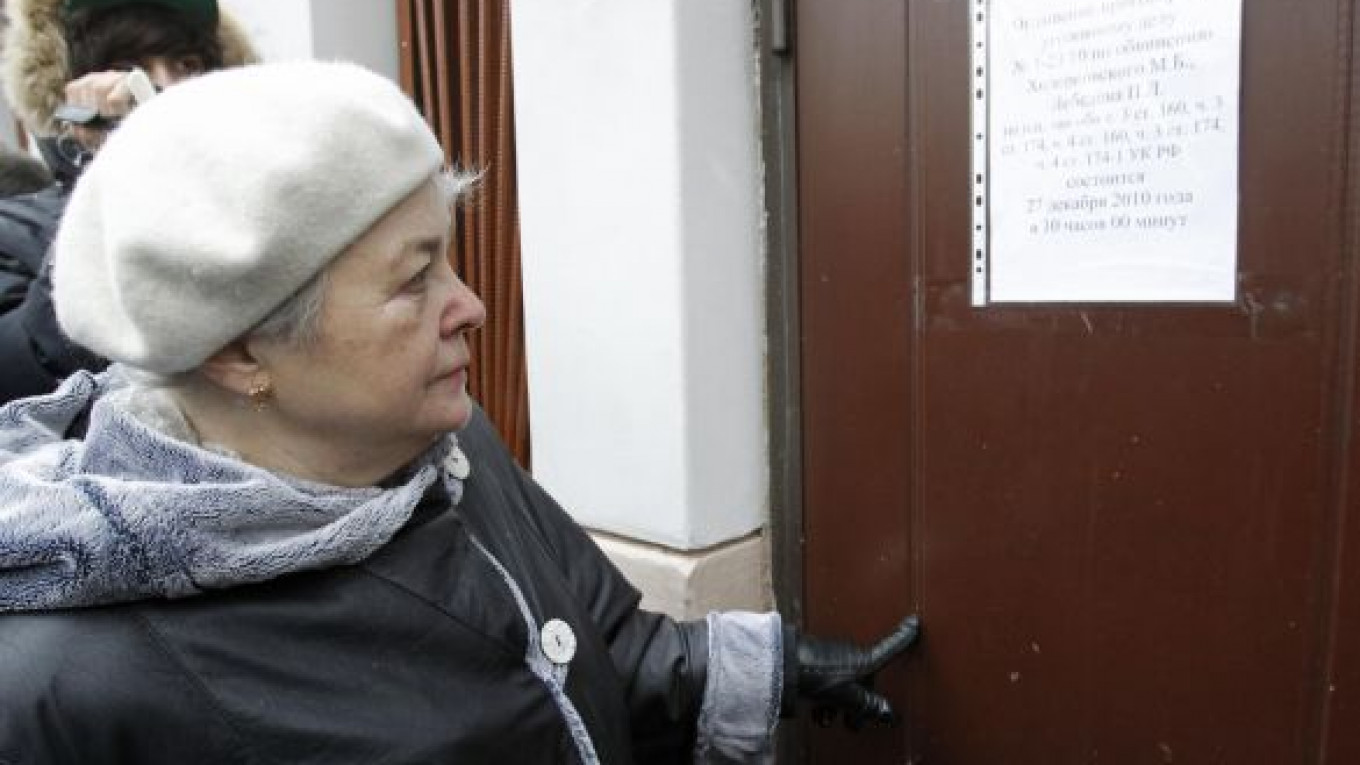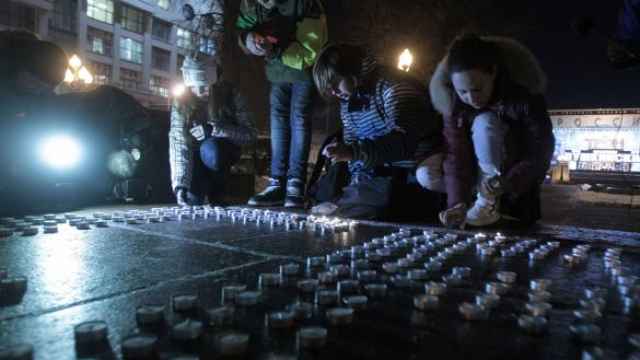A judge weighing the state's case against former Yukos CEO Mikhail Khodorkovsky and his business partner Platon Lebedev postponed his long-waited verdict Wednesday by two weeks without explanation.
The decision was reminiscent of the first 2005 trial against Khodorkovsky and Lebedev, when the verdict was abruptly postponed in the same manner, from late April until May 16. The court also gave no reason for the delay, but analysts speculated that then-President Vladimir Putin did not want to be asked uncomfortable questions during forthcoming Victory Day festivities, when he would host many foreign leaders.
Dozens of journalists and supporters arrived at Moscow's Khamovnichesky District Court on Wednesday morning to find a brief note on the door stating that the reading of the verdict had been put off until 10 a.m. on Dec. 27.
Khodorkovsky and Lebedev, serving eight-year sentences on fraud and tax evasion charges, face up to six more years in prison if found guilty of stealing 218 million tons of oil.
Court spokeswoman Natalya Vasilyeva told reporters outside the courthouse that Judge Viktor Danilkin had passed a note from the deliberations room saying he had decided to delay the verdict. She offered no reasons for the abrupt postponement.
Vasilyeva, reached by telephone late Tuesday afternoon, had confirmed that the reading of the verdict would start Wednesday and recommended coming early because many people were expected.
Relatives of the defendants and defense lawyers said they were not notified about the delay. Khodorkovsky's mother, Marina, stood outside the door of the court, reading the note about the delay.
“We expected to hear the beginning of the verdict in the morning,” Khodorkovsky's oldest son, Pavel, said by telephone from the United States, where he lives.
He said he had hoped that the judge's remarks, if not completed in one day, would at least provide an indication of whether the verdict would be guilty or not guilty.
Lawyers said it was hard to guess the reason behind the decision. “The only legal explanation is that the judge didn't have enough time to finish writing the verdict,” Yelena Liptser, a lawyer for Lebedev, told The Moscow Times.
Liptser said the delay reminded her of the 2005 postponement by the Meshchansky District Court. In May 2005, the court found both defendants guilty and dealt them nine-year sentences, later reduced to eight, in a case that was widely seen as Putin's revenge for Khodorkovsky's political and commercial ambitions.
Putin has called the case nonpolitical and described Khodorkovsky as a thief and a murderer. Khodorkovsky has never been charged with murder.
Pavel Khodorkovsky said he hoped that there were no political intrigues behind the postponement.
“I personally think that the final decision hasn't been made yet,” he said.
Lyudmila Alexeyeva, a veteran human rights advocate, said she saw the postponement as a “bad sign" and suggested that the authorities might be trying to smooth over anger about a guilty verdict by moving the announcement closer to the New Year's holidays.
“I remember the Soviet times when the authorities used that trick to make decisions that might spark public discontent,” Alexeyeva said by telephone.
The verdict, which is expected to be read over the course of several days, might be delivered either on New Year's Eve or after Jan. 10, when the court resumes its work after the long holiday break.
The delay also prevents a possible distraction to Putin's annual televised call-in show on Thursday, when he might make a comment about the case. During last year's show, Putin accused Khodorkovsky of ordering murders while running Yukos.
Only 4 percent of Russians believe that Khodorkovsky and Lebedev will be cleared in the second trial, according to a survey released by the independent Levada Center pollster on Tuesday. The poll interviewed 1,593 adults and had an error margin of 3.4 percentage points.
Khodorkovsky released no public statement about Wednesday's delay.
In his final statement in court, Khodorkovsky said he has no hope of being acquitted and is ready to die in jail.
A Message from The Moscow Times:
Dear readers,
We are facing unprecedented challenges. Russia's Prosecutor General's Office has designated The Moscow Times as an "undesirable" organization, criminalizing our work and putting our staff at risk of prosecution. This follows our earlier unjust labeling as a "foreign agent."
These actions are direct attempts to silence independent journalism in Russia. The authorities claim our work "discredits the decisions of the Russian leadership." We see things differently: we strive to provide accurate, unbiased reporting on Russia.
We, the journalists of The Moscow Times, refuse to be silenced. But to continue our work, we need your help.
Your support, no matter how small, makes a world of difference. If you can, please support us monthly starting from just $2. It's quick to set up, and every contribution makes a significant impact.
By supporting The Moscow Times, you're defending open, independent journalism in the face of repression. Thank you for standing with us.
Remind me later.






